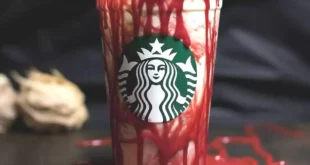Stuff Black People Don’t Like
April 24, 2015
The news of Hardee’s considering moving its national headquarters out of 49 percent black St. Louis was thankfully offset with the absolutely positive, riveting, and glorious announcement Starbucks is going to open up a store in 70 percent black Ferguson!
Cue up the marching band and order up a few tons of confetti for the ticker-tape parade!

Losing the national headquarters of a Fortune 500 company means absolutely nothing when a small suburb of St. Louis is going to get a Starbucks!
Even though corporate Starbucks locations don’t accept EBT/Food stamps, the store in Ferguson could represent a prototype in “community outreach” to a demographic completely alien from the traditional business model the coffee giant built its brand on. [Howard Schultz: Starbucks to open Ferguson store, Fortune, 4-22-15]:
Starbucks baristas may not be writing “Race Together” on customers’ coffee cups anymore, but CEO Howard Schultz certainly isn’t done talking about the nation’s touchiest topic.
On Tuesday, Schultz talked about his company’s efforts to address racial tension and announced that his coffee shop chain will open a location in Ferguson, Mo. as a “way to create employment.” Protestors clashed with police officers in the St. Louis suburb this summer, after the shooting death of 18-year-old Michael Brown, an unarmed black man, by a white cop.
Starbucks has locations in nearby Jennings and Florissant, Mo., and six stores in Lambert-St. Louis International Airport, but none in Ferguson.
Schultz tucked the Ferguson store news into comments he made on stage at an event hosted by NationSwell, a digital media company focused on American innovation and renewal. Schultz’s appearance at the event focused on his company’s ongoing efforts to combat racism and inequality in the United States, its education benefits for workers, and its recent commitment to hire military veterans and so-called opportunity youths, generally described as unemployed 16 to 24-year olds who have not followed a traditional education path.
After his on-stage interview, Schultz told Fortune that there was no specific timeline for the opening of a Ferguson store, and he declined to provide more information about plans for the location there. A Starbucks spokesperson did not provide an opening date but said that the Ferguson store is “part of our plan to build more stores in urban neighborhoods.”
Whenever Starbucks ultimately open its store in Ferguson, a city that’s 70% black, the location will counter the heavy concentration of Starbucks locations in predominantly white neighborhoods. By crunching Census figures and a dataset of 11,500 Starbucks locations in the United States as of August 2014,Quartz determined that the density of Starbucks stores increases along with the whiteness of census tracts.
On Tuesday, Schultz emphasized his belief that race relations is not too sensitive an issue for his company to tackle. Schultz has never shied away from using his platform as CEO of a Fortune 500 company to speak out on controversial political and social subjects. In 2013, he led a petition-based push urging Washington politicians to end the federal government shutdown. That year, he also wrote an open letter asking gun owners to refrain from bringing their firearms into stores.
Fortune reported in August that residents of St. Louis area, which includes Ferguson, have not felt the economic recovery equally. The unemployment rate for African Americans in the county of St. Louis City was 26% in 2012, according to the Census Department’s latest available stats. For white Americans, the unemployment rate was 6.2%.Employment figures from the fall of 2014 show that in Missouri, black unemployment was 15.7%; for whites it was 4.5%.
Losing Hardee’s corporate headquarters was news thankfully softened by the outrageously positive announcement 70 percent black Ferguson is getting a Starbucks!
A Starbucks!
There’s no doubt Starbucks is preparing to start a 501c3 as a way to offset the tremendous losses associated with opening franchises in heavily black areas, which has never been part of the corporations strategy or business model for growth.
But in Black-Run America (BRA), few actions such as opening a franchise in an increasingly non-white city will garner social justice points as Starbucks investing in 70 percent black Ferguson.
Trading Hardee’s corporate headquarters in downtown St. Louis for a lone suburban Starbucks franchise in 70 percent black Ferguson is an absolute victory for metropolitan St. Louis!
 Daily Stormer The Most Censored Publication in History
Daily Stormer The Most Censored Publication in History


